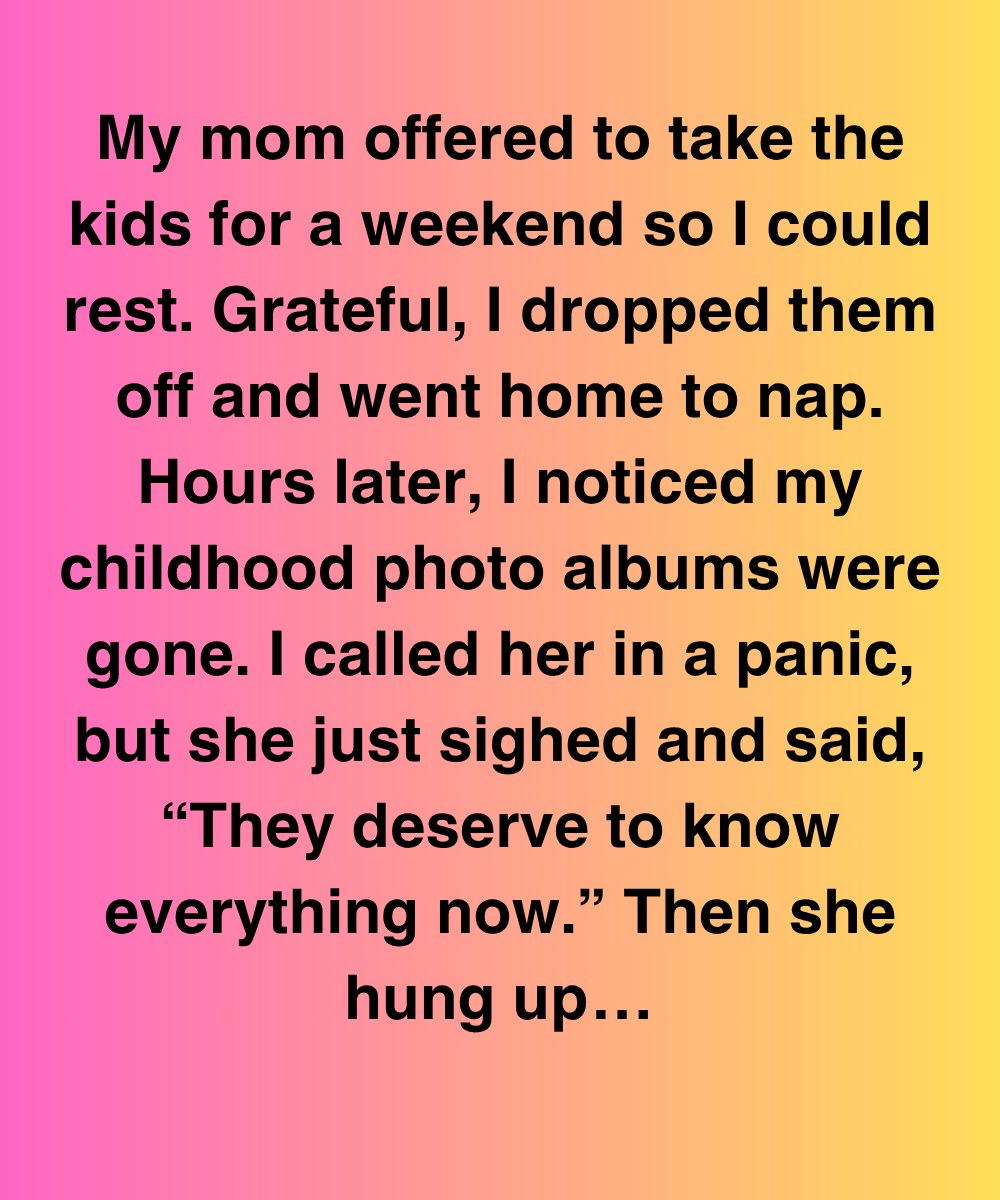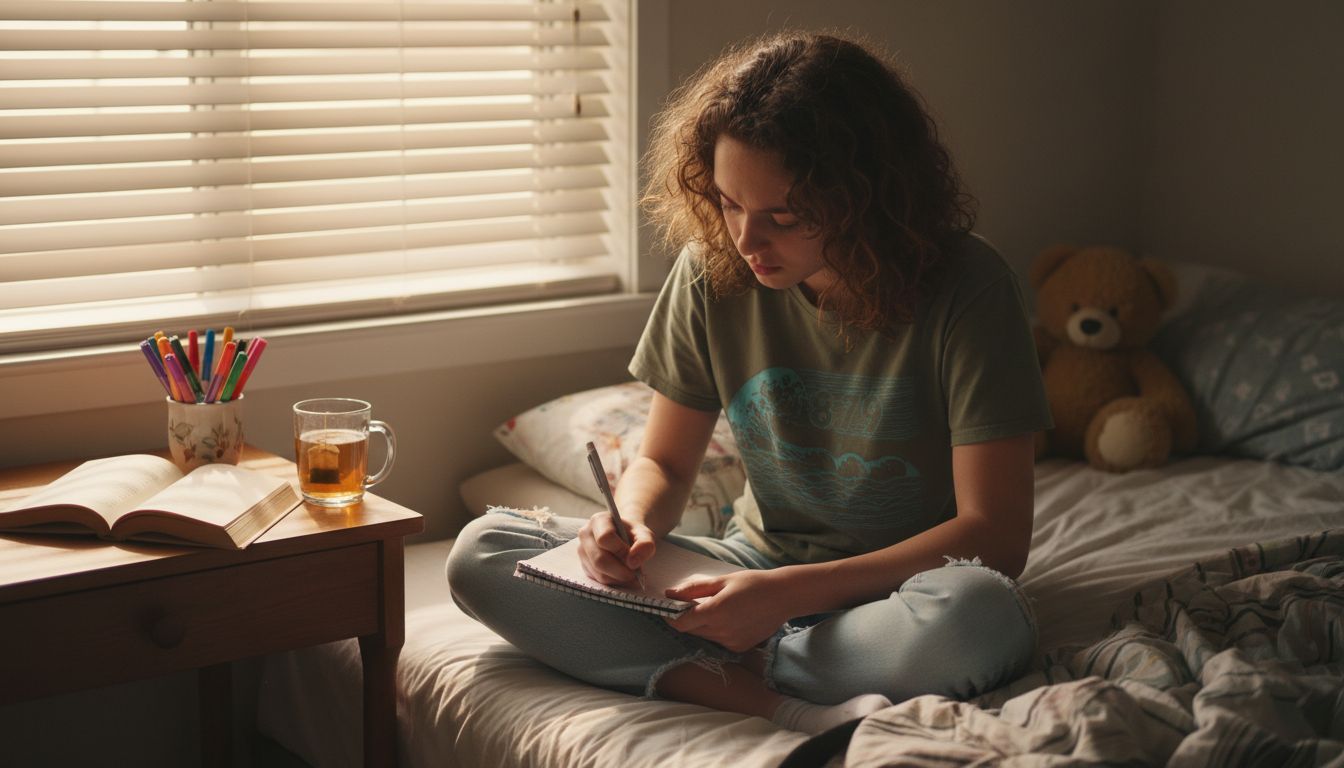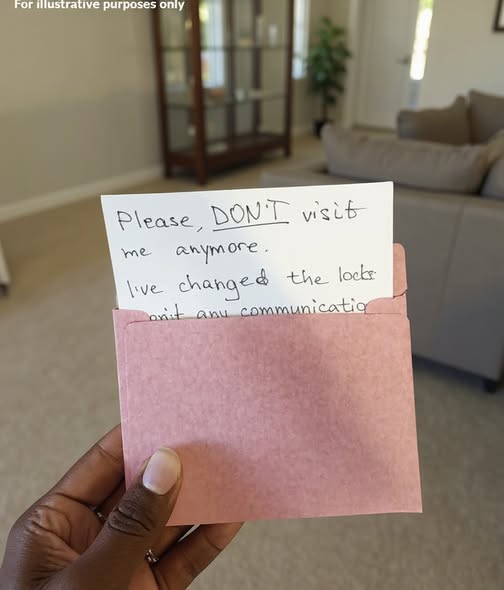
My mom offered to take the kids for a weekend so I could rest. Grateful, I dropped them off and went home to nap. Hours later, I noticed my childhood photo albums were gone. I called her in a panic, but she just sighed and said, “They deserve to know everything now.” Then she hung up.
I stood there, staring at the empty shelf where the albums used to be, like they’d vanished into thin air. They weren’t even hidden—just gone. My stomach dropped. Those albums weren’t just pictures; they held a whole part of my life I hadn’t shared with anyone. Not even my husband, Navid. And now my kids were sitting in my mother’s living room, possibly flipping through them like it was story time.
I drove over there immediately. No shoes, just socks in sandals and a sweatshirt on inside out. My heart was hammering so hard I could barely see straight. I wasn’t sure what terrified me more—what the kids might see or what else my mom might decide to spill.
When I got there, my son Kavi, nine, was on the porch eating a popsicle, all casual like nothing had happened. My daughter, Lila, seven, waved at me from the window. Inside, the living room was a mess of old photos, scrapbooks, and even old VHS tapes I didn’t know she still had.
Mom was in the kitchen stirring tea like she hadn’t just pulled the pin out of a family grenade.
“Where are the albums?” I asked, my voice shaking.
She didn’t even look up. “They’re looking at them. It’s time, Priya. You kept it buried long enough.”
I froze. “Time for what?”
She just sighed again and said, “They should know about their grandfather.”
My stomach lurched.
We never talked about him. Not since I was sixteen.
He left when I was nine. Or, at least, that’s the version I always told people. “Left” sounded cleaner than “vanished.” Cleaner than “got arrested.” Cleaner than “tried to come back when I was fifteen, and I slammed the door in his face.”
Navid knew he’d been absent. But I never gave him details. The kids knew I didn’t have a dad around growing up, but they never asked much.
Now Mom had apparently decided it was story hour.
I stormed into the den where the kids sat on the carpet flipping pages.
“Give me those,” I said, snatching the nearest book from Kavi’s lap.
“Why?” he blinked. “It’s cool! You looked just like Lila when you were little.”
I paused. It was a cute picture—me at five, front teeth missing, holding a stray kitten we’d rescued. But in the background, out of focus, was him.
He was leaning on the fence, shirtless, cigarette in hand. The one photo I always meant to remove.
“What did Grandma tell you?” I asked slowly.
Lila piped up, “She said your daddy went away because he was sick. Then he made mistakes.”
Mom appeared in the doorway, arms crossed, like she was waiting for a thank-you.
“That’s enough,” I said sharply, standing up. “Kids, get your stuff.”
“I’m not lying to them,” Mom said quietly. “You think silence protects them? Secrets rot people, Priya.”
Back home, I couldn’t sleep. I lay awake thinking of the day he came back when I was a teenager. He wore this stupid leather jacket, like something out of a movie. He said he was sober. Said he wanted to talk. I slammed the door. Never told Mom.
She never asked.
But the photos—God, there was so much in them. So many clues. Little smiles with big lies behind them.
The next morning, Kavi asked the question I dreaded.
“Was Grandpa a bad guy?”
I swallowed hard. “He… he struggled with some things.”
“Did he hurt you?”
I nodded. “Sometimes. Not with his hands, but with his choices. He broke a lot of promises.”
Kavi looked down, chewing his lip. “Like when you say you’ll play with us and then get busy?”
Oof.
It hit like a brick. And he wasn’t wrong.
That whole day, I kept thinking: maybe Mom had a point. Maybe silence wasn’t safer. But I also didn’t trust her version of things. She’d always been weirdly defensive of him. Like she needed him to be a tragic figure instead of a selfish one.
So, I did something wild. I called Navid at work and asked him to come home early.
“I think I need to tell you everything,” I said.
We sat at the kitchen table after the kids went to bed. I took a deep breath and told him everything. How my dad would disappear for days, then come back all jittery and broke. How I once found a needle in his sock drawer. How, when I was twelve, he pawned my flute—the one Mom saved up months to buy me.
How the last time I saw him, he had a black eye and offered me a wad of cash to tell Mom he stopped by. I never took the money. I never even opened the door.
Navid just listened. No judgment. Just soft eyes and slow nods.
“Why didn’t you tell me?” he asked finally.
“I didn’t want you to think I was broken,” I whispered.
He took my hand. “That doesn’t make you broken. That makes you brave.”
That night, I felt lighter. Like maybe the silence really had been rotting me.
But the real twist came two weeks later.
I was picking up groceries when I saw him.
At first, I wasn’t sure. He looked older, thinner. But the eyes were the same. He was helping a woman into a van. Her caretaker, maybe?
He saw me.
We locked eyes.
And then he nodded.
Just a small nod. No smile. No wave. Just… recognition.
I couldn’t breathe. I left the cart and walked straight out.
That night, I told Mom. She looked down at her lap and whispered, “He lives two blocks from here. Moved into a halfway house last year. He wanted to see you, but I told him not to push.”
“You knew?”
“I didn’t want to interfere,” she said. “But I also didn’t want him to die wondering if you hated him.”
I didn’t know what to say. I didn’t know what I felt.
So I did nothing.
For another month.
Until Lila brought home a school project where she had to draw her family tree.
“There’s a blank box next to ‘Mom’s Dad,’” she said. “Can I write ‘Don’t Know’?”
Something about that cracked me open.
I found the address online.
It was a brick building with peeling paint and a wheelchair ramp. He was sitting outside, feeding pigeons.
He looked up, startled. Then stood—too fast—and winced like his knee hurt.
“Hi,” I said.
“Hi,” he echoed.
We didn’t hug. Just stood there for a long time.
Finally, I said, “I have questions.”
He nodded. “I figured.”
We talked on a bench for over an hour. He told me he’d been clean for eight years. Said he went through every step of AA and NA, twice. Had a sponsor. Taught art at the center. Showed me some pencil sketches he’d done of the lake near the house I grew up in.
He didn’t ask for forgiveness. Didn’t beg for a second chance. Just told me he never stopped hoping I’d be okay.
I told him about Kavi and Lila. He teared up. Said he didn’t deserve to know them. I said, “Maybe not. But they deserve the truth.”
That was the moment I realized: you can’t protect your kids from pain. But you can teach them how to live through it.
A month later, we met again. This time, with Navid.
Another month, and I let him meet the kids—in a park, casual.
He didn’t pretend to be Grandpa of the Year. Just showed them how to draw birds, pointed out clouds that looked like dragons.
They didn’t ask much. Kids rarely do when you let them feel things in their own time.
The twist?
It turns out Kavi has a knack for sketching. Ever since that day in the park, he’s been filling notebooks. Birds, trees, cartoons, comic strips.
One day, he said, “I think maybe drawing skips a generation.”
And I swear I saw my dad bite his lip to keep from crying.
We still have boundaries. He’s not at every birthday. He doesn’t come to school plays. But he sends postcards. Handmade ones. And I keep every single one in a box next to the photo albums.
The same albums Mom gave back—eventually—with a note that said, “Sometimes the truth saves us before it ruins us.”
She was right.
Sharing the truth didn’t destroy my family. It expanded it.
Maybe forgiveness isn’t about erasing the past—it’s about deciding it doesn’t get to poison the future.
If this resonated with you, share it with someone who’s still carrying silence on their shoulders. Like and share if you believe people can change—and deserve the chance to.




